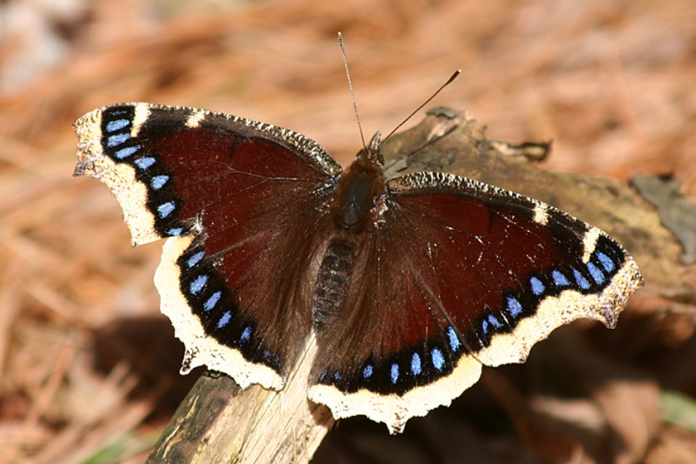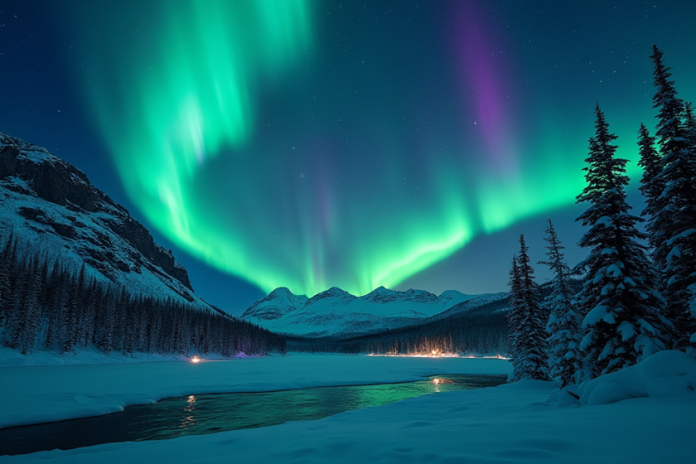The Mourning Cloak Butterfly (Nymphalis antiopa) is the official state insect of Montana, designated in 2001 through House Bill No. 365.
It’s notable for its striking appearance and unique life cycle, which allows it to thrive in our state’s cold, mountainous regions.
The Mourning Cloak has a wingspan of up to four inches, with dark maroon to brown upper wings featuring a broad yellow border and iridescent blue spots along the edges. The underside of its wings is gray with lighter brown edges, providing effective camouflage when resting on tree bark.
Mourning Cloaks are one of the earliest butterflies to emerge in spring, often appearing before winter snows have fully melted. They are known to hibernate as adults, seeking shelter under tree bark or in leaf litter during winter months. In spring, they can be seen basking in the sun to warm their bodies before flight, a critical behavior for their survival in colder climates.
Mourning Cloaks primarily feed on tree sap, which becomes available in spring as trees begin to exude sap from damaged areas. They are also attracted to flowers and can be seen feeding on dandelions and other early blooms.
The Mourning Cloak Butterfly is not only significant for its ecological role but also as a symbol of Montana’s natural heritage. Its long lifespan—up to 11-12 months—makes it one of the longest-living butterflies, allowing it to experience multiple seasons and contribute to the ecosystem over time.
Significance of the mourning cloak’s colors:
The iridescent blue spots on the Mourning Cloak butterfly serve several significant purposes.
1. Visual attraction: The bright blue spots create a striking contrast against the dark maroon wings, making the butterfly visually appealing. This feature may play a role in mate selection and species recognition.
2. Predator deterrence: The iridescent blue spots, combined with the yellow border, create a bold pattern that may startle or confuse potential predators. This visual display could serve as a warning signal, potentially deterring attacks.
3. Thermoregulation: The dark coloration of the wings, including the blue spots, helps the Mourning Cloak absorb heat efficiently. This is crucial for its survival in colder climates and enables it to be active earlier in spring compared to other butterfly species.
4. Symbolism: In some interpretations, the blue spots represent hope and renewal, contrasting with the darker overall coloration that symbolizes mourning or transformation. This juxtaposition of colors reflects the butterfly’s role as a symbol of rebirth and change in various cultural contexts.
5. Camouflage: When the butterfly’s wings are closed, the underside pattern, including the subdued version of the spots, helps it blend in with tree bark, providing effective camouflage.
Not only is the Mourning Cloak a visually striking butterfly, but it also holds profound spiritual meaning for some individuals.
In various cultures and beliefs, the Mourning Cloak Butterfly is viewed as a symbol of transformation, rebirth, and hope.
The name itself is derived from the historic garb worn during times of bereavement.
The butterfly’s appearance is believed to represent the process of mourning and healing, reflecting the soul’s journey from darkness and grief to light and renewal.
As it emerges from its cocoon, the butterfly signifies the metamorphosis we undergo as we face life’s challenges and evolve into more resilient beings.





Montana is seeing a sweep of Republican leadership
For the first time since 1897, Montana is seeing a sweep of Republican leadership across the Senate, governorship and congressional seats.
The 2024 election cycle marked a historic change for our state.
Republican Tim Sheehy ousted the long-serving Democratic Senator Jon Tester, marking the first time in over a century that Montana has two Republican Senators simultaneously.
Montana’s congressional seats have been consistently held by Republicans since 1997, with no exceptions in recent elections.
Greg Gianforte, a Republican, has been elected as governor, continuing the trend of Republican dominance in statewide executive offices.
The Republican Party has achieved super-majorities in both the Montana House and Senate, indicating strong control over state policy-making.
This shift has been attributed to several factors:
An influx of residents from traditionally blue states has brought a more conservative voter base to Montana, often referred to as “political refugees” looking for lower taxes and less regulatory environments.
The influence of national figures like Donald Trump has played a role, with his popularity in Montana contributing to Republican victories.
The Montana GOP has been assertive in its political strategy, maintaining a unified front and focusing on issues resonating with the state’s electorate, like less government intervention, pro-business policies, and cultural conservatism.
The political landscape in Montana has thus moved decidedly towards the right, solidifying its status as a red state, especially evident in the complete sweep of Republican leadership across its federal and state offices in the 2024 elections.
State level:
While Republicans dominated statewide offices, Democrats did make some gains in the state legislature.
Democrats are likely to pick up two seats in the state Senate and several more in the House.
These gains are attributed to a newly drawn legislative map and extensive grassroots campaigning.
Despite these legislative gains, Republicans maintain a strong majority in both chambers of the state legislature.
This Republican sweep in Montana reflects a broader trend of political realignment in the American heartland over the past two decades, with the state transitioning from a “purple” state to one where the GOP now enjoys widespread support and control of government institutions.